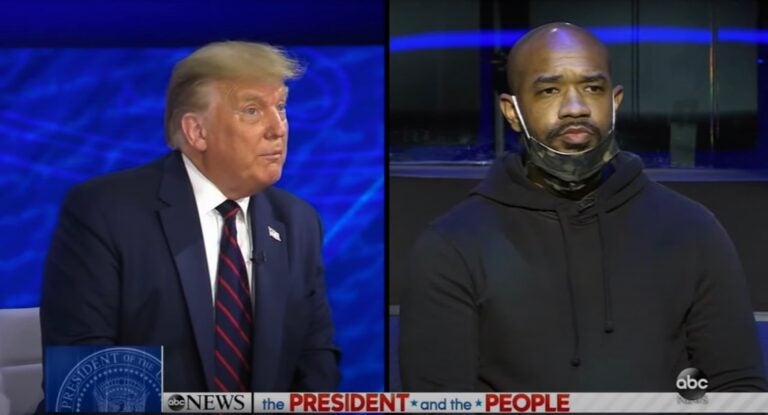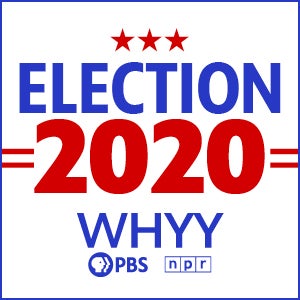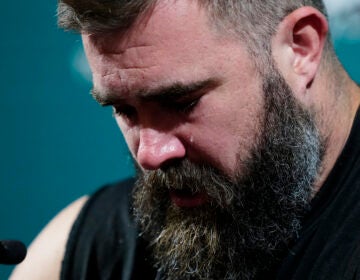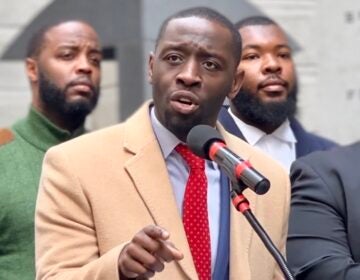Are Philadelphians inspired by Biden? The answer could help decide who wins Pa.
Philadelphia is safe territory for Democrats. But the margin by which Joe Biden wins the city could make a significant difference in a close election.

Philadelphia pastor Carl Day asks a question during President Trump's ABC News town hall in Philadelphia. (ABC News)
Carl Day is frustrated.
He’s a pastor at Culture Changing Christians Worship Center in North Philadelphia, and he got a lot of media attention this week for his appearance at a Philly town hall for undecided voters, at which he asked President Donald Trump a pointed question: when Trump says “Make America Great Again,” what great time period is he talking about?
“You have yet to address and acknowledge that there has been a race problem in America,” Day told the president.
“Well, I hope there’s not a race problem,” Trump answered. “I can tell you there’s none with me.”
Day isn’t going to vote for Trump, and he acknowledges he didn’t really go into the town hall expecting to be swayed. He happily voted for Barack Obama in 2008 and 2012, and cast his ballot for Green Party candidate Jill Stein in 2016.
He ended up in that pool of undecided voters, he said, because he’s having a hard time accepting the options he’ll have this November.
“I can’t deal with someone who really still fails to state the truth,” Day said of Trump’s answer brushing off systemic racism. “But on the other side, you don’t hear anything strategically — what’s in place? What’s going to be done?”
The way Day sees it, many Black Philadelphians have been set up to fail — segregated by institutional practices like redlining, stuck in underfunded schools, working jobs that don’t pay much above the federal $7.25 minimum wage while inflation increases and inequality grows.
He doesn’t think Democratic presidential candidates like Hillary Clinton, and now Joe Biden, think radically enough, and he believes other Philly voters are feeling similarly.
“I do feel to a degree, [the Democrats] feel very relaxed,” he said of their attitude toward Black Philadelphians. “They feel entitled to the vote.”
Election forecasters and pundits take as a given that Philadelphia voters will cast their ballots overwhelmingly for Democrats.
It’s a safe bet. Registered voters in Pennsylvania’s biggest city are 76% Democrats. The city is also about 44% Black, and in 2016, for instance, just 6% of Black voters were for Trump.
But Chris Borick, a professor and political analyst who runs the highly-rated Muhlenberg College poll, says in this election, what’s going to matter most is margins. How far can Joe Biden cut into Trump’s dominance among white voters who didn’t go to college? How many voters can Trump hang on to in the ever-bluer suburbs?
And how many people in big cities will be inspired to turn out for Biden?
“The number of Pennsylvanians right now that are unsure about their preferences is pretty small,” Borick said. “Marginal changes in regions across the state could have enormous impacts on the outcome.”
Philadelphia likely won’t be the biggest part of the margins equation.
True, in 2016 Hillary Clinton didn’t perform quite as well among Philly voters as Obama had in 2008 in 2012 — she had a 82.3% of the vote in 2016, compared with Obama’s respective 83% and 85.2% victories. But Obama was also exceptional — Clinton outperformed John Kerry, who won Philly with 80.4% in 2004. He won Pennsylvania, too, but lost the election.
Borick thinks Pennsylvania’s northeast and the Philly suburbs will be the regions that make more of a difference in who wins or loses in November. But the bottom line, he says, is that the margin of victory was razor-thin four years ago — Trump won Pennsylvania by just 0.7 percentage points.
“Everything matters,” he said. “And so all regions right now are going to play a role.”
In Thursday’s visit to Philadelphia, Vice Presidential candidate Kamala Harris stopped for a roundtable discussion with a group of Black women in Councilmember Cherelle Parker’s backyard, and made a few specific policy pitches.
Some are appeals for returning to Obama-era policies — the campaign’s health care plan, for instance, is based on bolstering the Affordable Care Act. Others are more radical — Biden and Harris have said they want to make four-year public colleges and historically Black colleges tuition-free for students from families that make less than $125,000 a year.
Harris also acknowledged something that Trump didn’t.
The pandemic, she said, has shown “what some of us have been knowing for generations, around issues like systemic racism and longstanding disparities that are perpetuated by systems and people.”
Day said he’s glad Democrats acknowledge systemic racism and the disadvantages that come with being a Black person in the U.S.
But he’s just left cold, he said, by the fact that he thinks their pitch relies on voters like him deciding they’re the better of two unappealing options.
“When the smoke clears, guess what? I still have to continue to pick up the pieces in my community,” he said. “So I’m not about to just settle for a, ‘hey, anybody but 45.’ No, I need better answers than that.”

Get daily updates from WHYY News!
WHYY is your source for fact-based, in-depth journalism and information. As a nonprofit organization, we rely on financial support from readers like you. Please give today.






